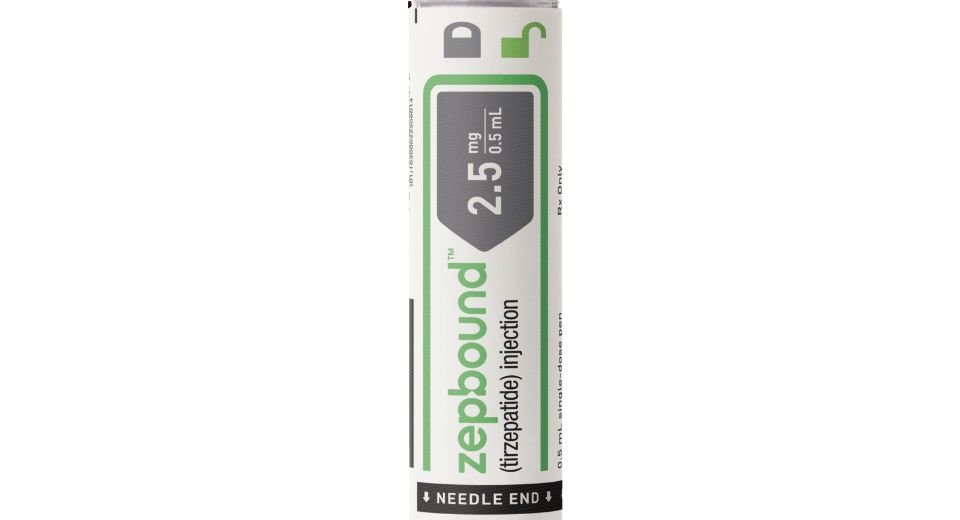HQ Team
November 9, 2023: Eli Lilly’s weight-loss injection Zepbound, to be taken along as a supplement with diet and exercise, got the USFDA and UK regulator’s nod after clinical trials proved adults lost 48 pounds on average during treatment.
The approval was based on results from late-stage trials on 2,539 adults with obesity, or excess weight and weight-related medical problems not including diabetes, according to a Lilly statement.
People taking Zepbound as an adjunct to diet and exercise experienced substantial weight loss compared with a placebo, or inert treatment, at 72 weeks.
“At the highest dose (15 mg), people taking Zepbound lost on average 48 lb, while at the lowest dose (5 mg), people lost on average 34 lb compared to 7 lb on placebo,” the company stated.
One in three taking Zepbound at the highest dose lost over 58 lb. (25% of body weight), compared to 1.5% on placebo. The average starting weight was 231 pounds.
$1,059.87 cost
The treatment is expected to be available in the US by the end of the year at a list price of $1,059.87 a month, which is approximately 20% lower than semaglutide 2.4 mg injection for weight loss, according to Eli Lilly.
“Obesity is a chronic disease that can result in serious health complications, including heart disease, stroke and diabetes. Despite our knowledge of obesity as a treatable, chronic disease, people living with obesity still face many challenges in their health and weight management journey,” said Joe Nadglowski, president and chief executive officer of the Obesity Action Coalition.
“New treatment options bring hope to the many people with obesity who struggle with this disease and are seeking better options for weight management.”
More than 1 billion people worldwide are obese – 650 million adults, 340 million adolescents and 39 million children.
The WHO estimates that by 2025, approximately 167 million people – adults and children – will become less healthy because they are overweight or obese.
Weight-related problems
Zepbound is meant to treat people who are overweight and also have weight-related medical problems such as hypertension, dyslipidemia, type 2 diabetes mellitus, obstructive sleep apnea or cardiovascular disease, to lose weight.
“While not approved to treat these conditions, in a clinical trial, people who dieted, exercised and took Zepbound for the treatment of obesity or overweight with weight-related medical problems observed changes in cholesterol and reductions in blood pressure and waist size.”
It should be used with a reduced-calorie diet and increased physical activity, according to the company statement.
The medicine’s adverse effects include nausea, diarrhoea, vomiting, constipation, abdominal pain, dyspepsia, fatigue, hypersensitivity reactions, eructation, hair loss and gastroesophageal reflux disease.
In studies, most nausea, diarrhoea and vomiting occurred when people increased their dose – but the effects generally decreased over time.
Zepbound activates receptors of hormones secreted from the intestine and glucose-dependent insulinotropic polypeptide to reduce appetite and food intake.
Zepbound is administered by injection under the skin once weekly, and the dosage must be increased over four to 20 weeks to achieve the target dosages of 5 milligram (mg), 10 mg or 15 mg once weekly. The maximum dosage of Zepbound is 15 mg once weekly, sccording to the FDA statement.
UK regulatory clearance
The Indianapolis-based company’s drug tirzepatide has been on the shelves as Mounjaro for type 2 diabetes since 2022 and has increasingly been used “off-label” for weight loss while the obesity approval was pending.
The UK’s Medicines and Healthcare products Regulatory Agency (MHRA) approved Mounjaro on November 8, for weight loss and weight management in adults aged 18 and over.
Mounjaro is now authorised for adult patients with obesity, as well as those who are overweight and have weight-related health problems such as prediabetes, high blood pressure, high cholesterol, or heart problems, according to an MHRA statement.
“We have prioritised rapid assessment of this new indication for Mounjaro, given the public health importance of access to new medicines to help tackle obesity,” said Julian Beach, MHRA Interim Executive Director, Healthcare Quality and Access.
“We have drawn on advice from the independent Commission on Human Medicines in coming to our decision, and as with all products, will keep the safety of Mounjaro under close review.”
The global market for weight-loss drugs such as Novo Nordisk’s Ozempic and Wegovy may reach $100 billion by 2035, according to BMO Capital Markets. Revenue for the medications could reach as high as $70 billion in the US alone.








